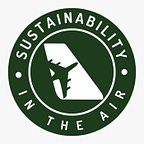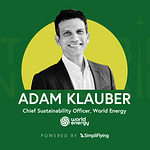In this episode of our ‘Sustainability in the Air’ podcast, Matt Finch, UK Policy Manager at Transport & Environment (T&E), speaks with SimpliFlying’s CEO Shashank Nigam and provides a critical perspective on current efforts to decarbonise the aviation industry. In particular, he discusses T&E’s role as Europe’s leading advocate for clean transport and suggests aviation needs more ambitious policies and actions to address its environmental impact.
Advocates vs the industry
Regular readers and listeners of ‘Sustainability in the Air’ will know that the chasm between the aviation industry and climate advocates and research groups continues to echo with disagreements.
Arguably, this chasm often appears too vast to bridge.
The industry believes it’s making significant strides in its journey — there is a net zero target; SAF production is increasing; planes are more efficient than ever; regional hydrogen and electric flying is possibly a few years away.
Climate advocates usually have a single-phrase response to all these arguments: “not enough”.
Is there a point to platforming views that are diagonally opposite and, indeed, opposed to each other? The answer is yes.
Our stance is clear: the magic of flying deserves to be preserved for all the cultural and economic miracles it enables. However, not at the cost of the planet. Our quest, therefore, remains to showcase all good-faith arguments that can advance the industry to a green future.
Our credo remains Joubert’s adage: “The aim of argument, or of discussion, should not be victory, but progress.” To progress then, and all the arguments that get us there!
Here are the key highlights of the conversation with Matt Finch:
The lack of fuel duty on aviation fuel (3:01)
UK’s SAF mandate and its limitations (11:22)
Challenges in scaling up SAF production (16:06)
The environmental impact of airport expansion (34:39)
The importance of addressing non-CO2 impacts of aviation (39:40)
Parallels between aviation and road transport decarbonisation (41:34)
The UK’s potential to lead in sustainable aviation innovation (43:54)
Rapid Fire! (42:51)
Keep reading for a quick overview of the episode.
Why lessons from the road sector matter
Given his extensive background in the road transport sector, Finch sees parallels between the challenges faced by aviation today and those encountered by the road sector a couple of decades ago:
Technological debates: Just as the road sector grappled with questions about electric vs. hydrogen vehicles, aviation is now facing similar debates about the best path forward for zero-emission aircraft.
Fuel decarbonisation: The discussions around SAF mirror earlier debates about biofuels in road transport, including concerns about feedstock sustainability and scalability.
Regulatory frameworks: The development of effective policies to drive decarbonisation in aviation echoes the earlier process of establishing emissions standards and incentives in the automotive sector.
Infrastructure challenges: The need for new refuelling infrastructure for SAF and potentially hydrogen aircraft parallels the rollout of electric vehicle charging networks.
“A lot of the discussions we’re having now in aviation we had about 20 years ago in [the] road [sector]. ‘Should we decarbonise the fuel? What’s the best feedstock for biodiesel? What are the knock-on effects? Could we go electric or should we go hydrogen?’ We had all of these things.”
Finch argues that aviation can learn from the road transport experience, potentially accelerating its own decarbonisation journey. However, he also cautions that the unique challenges of aviation, such as the longer lifespan of aircraft and the international nature of the industry, may complicate this process.
Five ways aviation can get serious about decarbonisation
1. Well, begin by getting serious
Finch argues that the aviation industry’s current decarbonisation efforts lack the necessary urgency and ambition to meet climate goals.
First, the sector’s growth outpaces its decarbonisation efforts. Second, there is an over-reliance on future technologies, such as electric and hydrogen aircraft, without immediate action. And third, there are insufficient policy measures to drive change.
“Even with the most optimistic forecasted aircraft fuel burn improvements, which will not happen without effective regulation, emissions would rise by 36% by 2050 compared to levels in 2020.”
So what can the industry do? In March 2022, T&E published a decarbonisation roadmap for European aviation. It suggested the following:
Demand management through carbon pricing and reducing business travel;
Deployment of SAF, particularly e-kerosene;
Development of zero-emission aircraft technologies like electric and hydrogen planes;
Improving aircraft efficiency and operations;
Addressing aviation’s non-CO2 climate impacts.
Specifically, the report emphasised the need for binding measures and policy support to drive these changes. It projected that demand management could reduce emissions by over 50% by 2050. SAF uptake, particularly e-kerosene, is seen as crucial but faces production and cost challenges. New aircraft technologies are promising but will take decades to make a significant impact. Overall, a combination of these measures, along with strong policy action, is necessary.
2. Getting serious about mandates and fuel taxes
Finch argues that the absence of fuel duty on aviation fuel creates an unfair advantage for the sector and removes a key incentive for decarbonisation. He says this tax-free status artificially suppresses the cost of air travel and hinders the transition to more sustainable alternatives.
“We apply fuel duty and we do this because of what economists call negative externalities. We all know about it. Burning fuel causes knock-on costs to society. And we charge for everyone who burns fuel apart from airlines.”
While Finch acknowledges the importance of the UK’s SAF mandate, he expresses concerns about its long-term ambition and highlights several challenges in scaling up SAF production such as limited feedstocks, high production costs and lack of production facilities.
His most interesting contention is that airlines may indulge in “creative accounting” and use SAF only on mandated routes while continuing to use conventional fuel elsewhere, limiting the overall emissions reduction.
3. Not pinning too many hopes on alternative technologies
Finch sees potential in alternative technologies like hydrogen and electric aircraft, particularly for shorter routes. However, he emphasises that these technologies are still in early stages and will require significant government support to become viable.
“We do believe that some of these emerging propulsion technologies have the potential to contribute to our decarbonisation in our island. But it’s going to take time for these technologies to develop.”
He advocates for stronger government intervention, suggesting policies that would guarantee airlines fly zero-emission planes. “You know what? I’m completely relaxed if airports expanded and they were only allowed to fly zero emission planes with that expansion,” he says.
4. Managing airport expansion
Finch strongly opposes unchecked airport expansion, arguing that it contradicts decarbonisation goals. Instead, he proposes conditional expansion tied to strict environmental criteria.
“Most UK airports at the moment are trying to expand somehow. It might not be the runway, but planning permission has gone in for various things. This year, we’re going to hear about City Airport, we’re going to hear about Gatwick, and we’re going to hear about Luton. All of which will mean that there are more flights with bigger planes taking off, all of which means more emissions.”
Instead of multiple airport expansions that increase emissions and create long-term high-emission infrastructure, Finch advocates for better utilisation of existing capacity and investment in alternatives like high-speed rail. He also rubbishes the economic justification for airport expansion, suggesting that the claimed benefits are often overstated or fail to materialise.
5. Addressing non-CO2 impacts
Finch emphasises that focusing solely on CO2 emissions overlooks a significant portion of aviation’s climate impact. Instead, a more comprehensive approach is called for — one that measures and mitigates aviation’s environmental impact beyond just carbon emissions to include the impact of contrail formation as well as Nitrogen Oxides (NOx).
“Non-CO2 impacts have been conveniently ignored by the sector for quite a long time now. We’ve known about non-CO2 impacts for decades. The David Lee paper that came out just a few years ago suggests that it’s actually two-thirds of aviation’s overall climate impact.”
Overall, Finch argues that the road to decarbonisation will require a combination of technological innovation, policy reform, and a fundamental shift in how we approach air travel. Only by addressing these challenges can the aviation industry hope to retain the social licence to operate.
‘Sustainability in the Air’ is the world’s leading podcast dedicated to sustainable aviation. Through in-depth conversations with top aviation leaders, we break through the clutter and provide a clear roadmap for a net-zero future.















